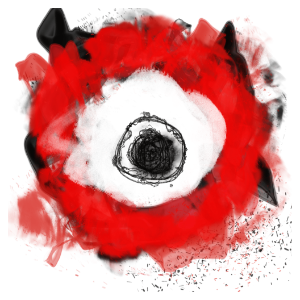Fire is an important part of stewardship of the land. At some points, it is necessary to burn what is there so that new life can grow. While we will always thank the goddess for what she does for our land, we cannot help but also feel a great sadness for what the Great Fire brought in the name of renewal.— Shaman of the Cradle of Clay
For months, the thick white smoke hung in the air like thunderheads threatening to spill their rain, but there was no reprieve from the ash that fell from the clouds, blanketing the scorched earth like blackened snow. Bodies that waged war on the flames came away dark with soot, their sweat marking trails as it cleared the substance from their skin. Fire was a part of their life, but even their preparations were not enough to stop what was currently burning swathes of land from the northernmost point of the
Cradle towards the south.
The Great Fire would be considered one of the worst natural disasters in the history of Isekai but to those who survived it, the wake of destruction left in its path was every bit as devastating as what would come during the
Eldritch War. Started by a single strike of lightning, the fire would burn through the
Cradle of Clay over the course of months, consuming land, buildings, and people that stood in its way. Eventually, a natural fire line would be drawn to the north as the fire ran into the desolation of the
Neither Tundra, but without intervention, the fire would have continued to burn deep into the
Great Plains to the south.
Spread
Beginning late at night during a thunderstorm in Summer’s Morning, the fire was quickly pushed out of its valley of origin by swift winds and low-lying course vegetation. Because of the remoteness of the valley, it is believed the fire burned for nearly a week before residents of the area saw smoke or smelt the fire itself. Once identified, the
Clay Giants of the area utilized dug fire lines and carts of water, but these measures could not stop a fire that was spurred by a dry season and high winds.
Any early attempts to make fire lines were quickly outrun as the winds continued for the next month. With water needing to be taken to the more remote areas and the winds, little headway was made against the fire as more and more
Clay Giants were called from other villages to assist. Oral histories report that at one point during the Great Fire, all able-bodied
Clay Giants that were not necessary for the daily function of their villages were called to the front lines of the fire in order to stop it.
As the months wore on, the fire eventually spread to encompass a large majority of the
Cradle of Clay. Villages had been burned, animals that could not escape the quick-moving flames were lost, and those fighting the fire were fighting a losing battle. Fatigue, dehydration, and smoke inhalation were large problems for those working on the front lines.
Eventually, those fighting the fire would catch a break as the fire reached the northern border and lost any fuel as it tried to enter the
Neither Tundra. The desolation of the tundra provided a natural fire line that even large amounts of wind could not cross. The same could not be said for the southern edge of the fire.
Aftermath
As the summer wore on, the fire eventually spread to within miles of the
Great Plains and the notorious
Traveler's Grass that covered the area. With one of the greatest disasters in history knocking on their doorstep, the
Human Empire offered aid to the tiring
Clay Giants. A number of
Mages and
Soldiers were sent to begin utilizing magic to slow the spread of the fire and start putting out hot spots that still remained in areas that had already burned.
After nearly six months and the aid of hundreds of
Mages,
Soldiers, and others from throughout the
Human Empire, the Great Fire was finally said to be put out. For the remainder of the fall months, hot spots were still found within remote valleys, but a handful of
Mages remained on hand in the villages to make sure that the fire would not spread again.







This is a really well written piece Riverfang, very interesting read. It sounds like a disaster that really got out of hand, and caused a lot of problems for those living in the region for sure, to put it mildly. The scale and scope is well suggested, and seems to have been frankly massive.